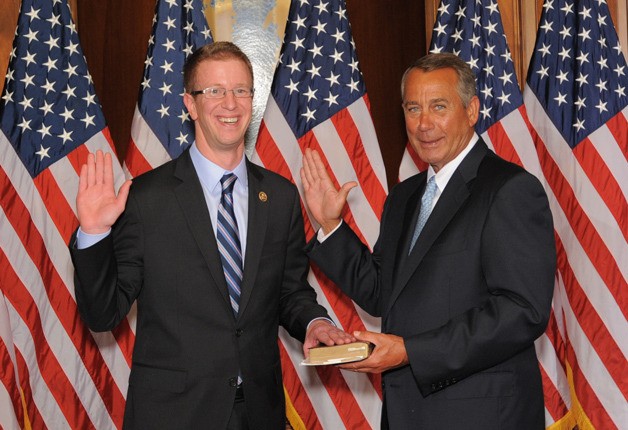U.S. Representative Derek Kilmer took the oath of office this week for his second term in Congress, and the 6th District Congressman vowed to continue his work on jobs and helping the nation’s veterans and men and women in uniform.
“It’s an honor to work for people in our region as their Representative. I’m committed to getting this economy and this Congress back on track,” said Kilmer, a Democrat from Gig Harbor.
The 114th Congress convened on Tuesday, Jan. 6, with Republicans taking control of both the Senate and the House of Representatives.
Members of Congress were sworn in Tuesday, and Kilmer took the oath of office in a ceremony with newly re-elected Speaker of the House John Boehner.
Kilmer, who easily won re-election in November by garnering nearly 63 percent of the vote against Republican challenger Marty McClendon, said his priorities include the economy and the environment.
“The fact is there’s a lot of work to do. We’ve got an economy that’s not growing fast enough — with too many small businesses struggling and too many families who are feeling squeezed,” he said.
“We’ve got extraordinary challenges facing our environment, including ongoing threats to the health of Puget Sound. And we’ve got to do more for our veterans and service members because if you serve our country, we should have your back,” Kilmer said.
“Those are the priorities that I’ll keep fighting for in the years ahead. I will do all I can to remain accessible and accountable to the folks I represent,” he said.
Kilmer began the week by reintroducing a bill from December that would reverse the increase in the amount of money donors can contribute to political parties.
The expansion of campaign finance limits was included in the “cromnibus” end-of-year spending bill that was signed into law by President Obama.
Kilmer’s legislation, the Close the Floodgates Act, would bring back the cap on individual donor contributions for political parties at $97,200 per year.
The bill is cosponsored by Representatives David Cicilline (D-RI), Jim McDermott (D-WA), Scott Peters (D-CA) and Jim Himes (D-CT).
Kilmer noted that during the 2014 election cycle, candidates, parties and outside groups raised and spent more than $3.5 billion.
Campaign spending continues to climb in light of recent Supreme Court decisions.
In 2014, the Supreme Court struck down limits on overall campaign contributions individual donors can make to candidates, political parties and political committees. And in 2010, the Supreme Court ruled in its Citizens United decision that corporations, labor and some advocacy groups should not face limits on independent political expenditures.
Kilmer’s new term follows a productive freshman session where he was one of only three newly-elected Democratic lawmakers who had two bills signed into law.
Kilmer championed the American Savings Promotion Act, a bipartisan bill that let more financial institutions offer prize-linked savings accounts, and he was also able to win passage of a bill to properly rename the memorial on Bainbridge Island as the Japanese American Exclusion Memorial.


